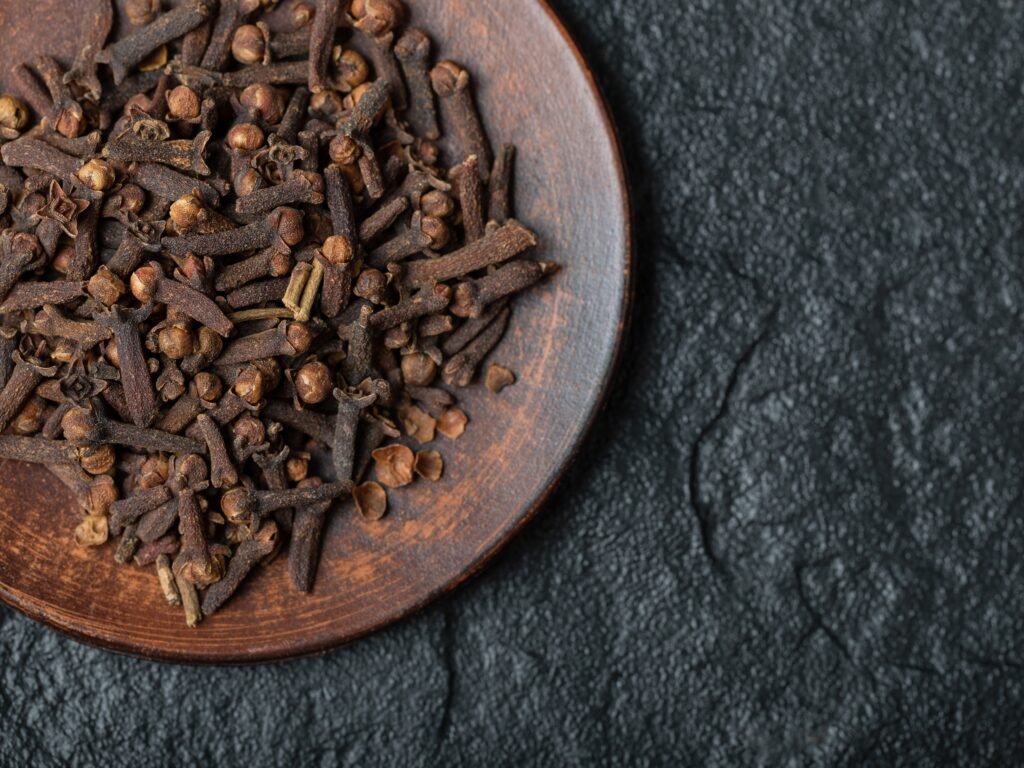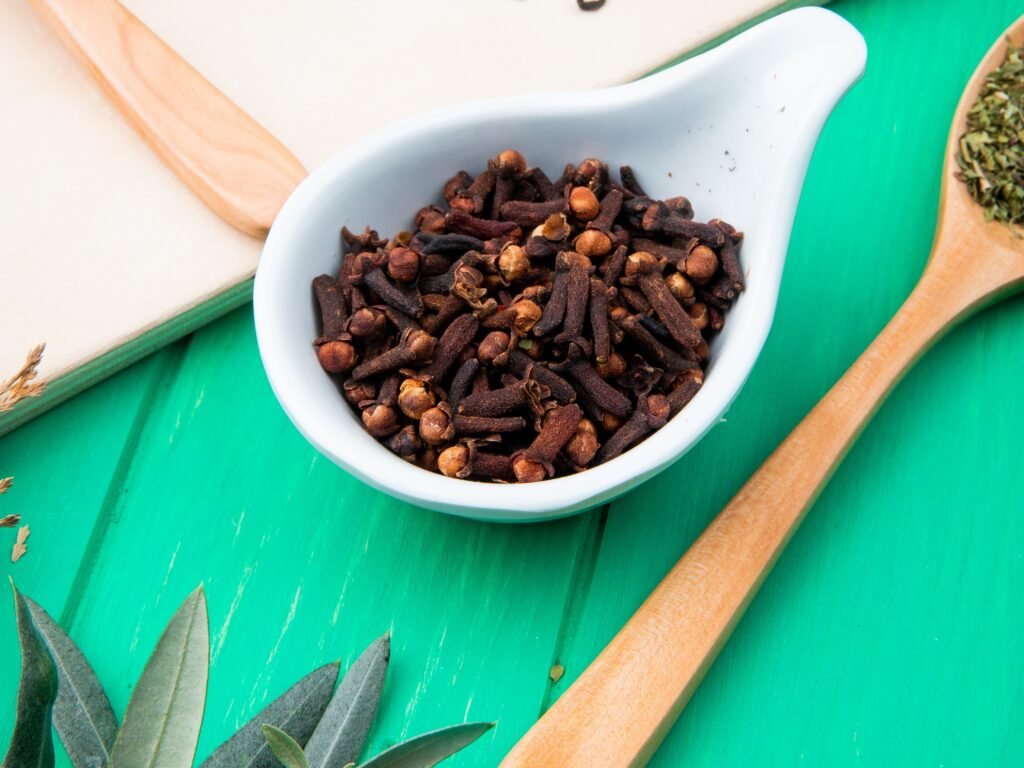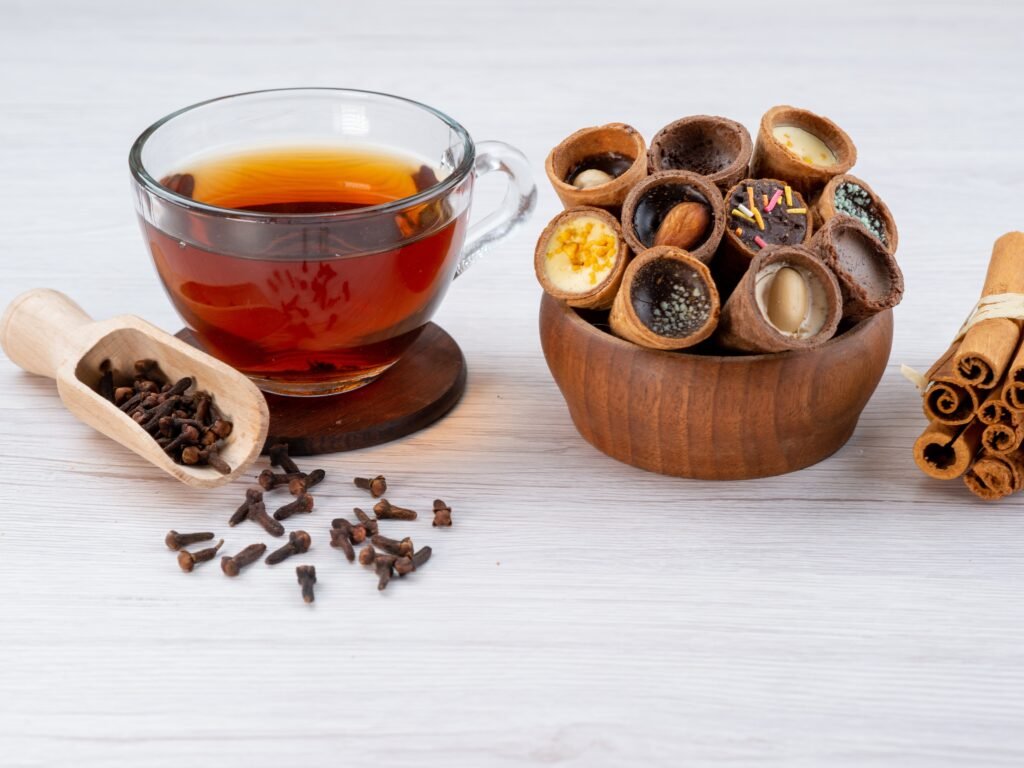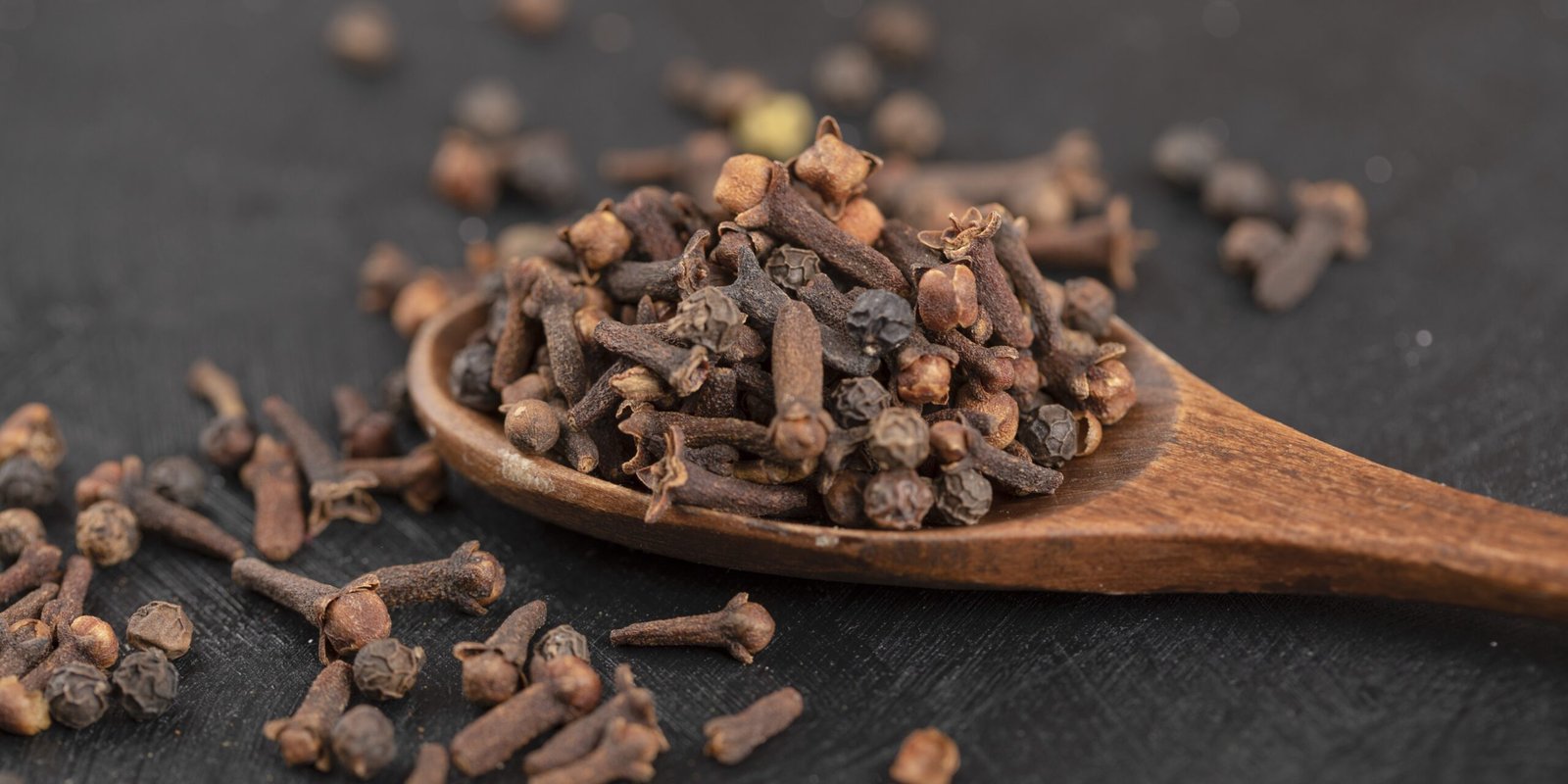Table of Contents
Cloves, with their warm, aromatic fragrance and distinctive flavour, have been cherished for centuries across cultures and civilizations. In this journey, we delve into the nutritional richness and therapeutic properties of cloves, uncovering their potential to enhance health and well-being. From their potent antioxidant and anti-inflammatory effects to their role in digestive health, cloves offer a myriad of reasons to make them a staple in your pantry. Join us as we unravel the secrets of cloves and discover how this versatile spice can contribute to your overall health and vitality.
Cloves are scientifically known as Syzygium aromaticum and have an intriguing origin intertwined with ancient trade routes and exotic locales. Native to the Maluku Islands in Indonesia, cloves have been cultivated and prized for their aromatic and medicinal properties for thousands of years. Historically, cloves were so highly valued that they played a pivotal role in shaping world history, attracting traders from distant lands and sparking exploration in search of their source. The Maluku Islands, also known as the Spice Islands, became synonymous with the production of cloves and other coveted spices during the Age of Exploration.
Over time, cloves spread to other tropical regions such as Zanzibar, Madagascar, and India, where they continue to be grown today. This rich history and cultural significance highlight the enduring allure of cloves, making them an integral part of global cuisine and wellness practices.
NUTRITIONAL VALUE

Cloves are not only prized for their aromatic flavour but also for their rich nutritional profile. These small, dried flower buds pack a powerful punch of essential nutrients and bioactive compounds. Just one teaspoon of ground cloves provides approximately 21 calories and contains significant amounts of manganese, vitamin K, and dietary fiber. Cloves are also a potent source of antioxidants, particularly phenolic compounds such as eugenol. These antioxidants help neutralize harmful free radicals, protecting cells from oxidative damage and reducing the risk of chronic diseases such as heart disease and cancer.
Additionally, cloves contain essential oils, including eugenol, which possesses anti-inflammatory and antimicrobial properties. Incorporating cloves into your diet not only adds flavour and aroma to dishes but also offers a range of potential health benefits, making them a valuable addition to any well-balanced diet.
HEALTH BENEFITS

Cloves offer an array of health benefits, owing to their rich nutritional profile and potent bioactive compounds.
ANTIOXIDANT ACTIVITY
Cloves are one of the richest sources of antioxidants among spices. They contain high levels of phenolic compounds, including eugenol, which exhibit strong antioxidant properties. These antioxidants help neutralize harmful free radicals, protecting cells from oxidative stress and reducing the risk of chronic diseases such as heart disease, cancer, and neurodegenerative disorders.
ANTI-INFLAMMATORY EFFECTS
Eugenol, the primary compound in cloves, possesses powerful anti-inflammatory properties. It helps reduce inflammation in the body by inhibiting the production of inflammatory enzymes and mediators. Cloves may help alleviate symptoms of inflammatory conditions such as arthritis, rheumatism, and inflammatory bowel diseases.
ANTIMICROBIAL AND ANTIFUNGAL PROPERTIES
Cloves exhibit broad-spectrum antimicrobial and antifungal activities, thanks to their high eugenol content. They can inhibit the growth of bacteria, viruses, fungi, and parasites, making them effective in preventing infections and promoting oral health. Clove oil is commonly used in dental care products for its antimicrobial properties.
DIGESTIVE HEALTH
Cloves have been traditionally used to aid digestion and relieve gastrointestinal discomfort. They stimulate the production of digestive enzymes, which helps improve digestion and nutrient absorption. Cloves may also help alleviate symptoms of indigestion, bloating, gas, and nausea.
DENTAL HEALTH
Clove oil is widely used in dental care for its analgesic, antimicrobial, and antiseptic properties. It can help alleviate toothache and gum pain, reduce inflammation, and prevent bacterial growth in the mouth. Clove oil is often added to toothpaste, mouthwashes, and dental gels for its oral health benefits.
PAIN RELIEF
Cloves have analgesic properties and are commonly used to alleviate pain and inflammation. Clove oil or clove-infused ointments can be applied topically to painful areas to provide relief from muscle aches, joint pain, headaches, and toothaches.
BLOOD SUGAR REGULATION
Some research suggests that cloves may help regulate blood sugar levels and improve insulin sensitivity. Cloves contain compounds that mimic insulin and enhance glucose uptake by cells, helping to lower blood sugar levels. Regular consumption of cloves may benefit individuals with diabetes or those at risk of developing the condition.
HEART HEALTH
Cloves may have cardio-protective effects due to their antioxidant and anti-inflammatory properties. They can help improve blood circulation, reduce cholesterol levels, and prevent blood clot formation, thereby lowering the risk of heart disease and stroke.
RESPIRATORY HEALTH
Cloves have been used in traditional medicine to relieve respiratory symptoms such as coughs, colds, and asthma. The expectorant properties of cloves help loosen mucus and phlegm, making it easier to expel from the respiratory tract.
CANCER PREVENTION
Some studies suggest that cloves may have anti-cancer properties, including the ability to inhibit the growth and spread of cancer cells. The antioxidants in cloves may help protect cells from DNA damage and prevent the formation of tumours.
PRECAUTIONS

While cloves offer numerous health benefits, it’s important to be aware of potential precautions and drawbacks associated with their consumption:
ALLERGIC REACTIONS
Some individuals may be allergic to cloves or develop allergic reactions upon exposure. Symptoms of clove allergy may include skin rash, itching, swelling, or difficulty breathing. Individuals with known allergies to spices or related plants, such as members of the Myrtaceae family, should avoid cloves or use them with caution to prevent allergic reactions.
SKIN SENSITIVITY
Direct contact with clove oil or clove-based products may cause skin irritation or allergic reactions in some individuals, particularly those with sensitive skin. It’s advisable to perform a patch test before using clove oil topically and discontinue use if irritation occurs.
GASTROINTESTINAL ISSUES
In some individuals, consuming large amounts of cloves or clove supplements may cause digestive discomfort, including nausea, bloating, or diarrhoea. Cloves stimulate the production of digestive enzymes, which may lead to gastrointestinal irritation, especially in sensitive individuals or those with pre-existing digestive conditions.
BLOOD SUGAR REGULATION
Cloves may affect blood sugar levels and interact with diabetes medications. Individuals with diabetes or those taking medications to lower blood sugar should monitor their blood glucose levels closely when consuming cloves or clove supplements and consult with their healthcare provider as needed.
MEDICATION INTERACTIONS
Cloves may interact with certain medications, including blood thinners, anticoagulants, and drugs metabolized by the liver. Cloves contain compounds that can inhibit blood clotting and affect liver enzyme activity, potentially altering the effectiveness or safety of medications. Individuals taking medication should consult with their healthcare provider before using clove supplements or significantly increasing clove consumption.
PREGNANCY AND BREASTFEEDING
While cloves are generally considered safe when consumed in moderate amounts as a spice in food, there is limited research on their safety during pregnancy and breastfeeding. Pregnant or breastfeeding women should consult with their healthcare provider before using clove supplements or consuming large amounts of cloves to ensure safety for themselves and their baby.
TOXICITY
Ingesting large amounts of cloves or clove oil may lead to toxicity symptoms, including nausea, vomiting, dizziness, and abdominal pain. Clove oil is highly concentrated and should be used sparingly and diluted properly to prevent adverse effects. Accidental ingestion of large quantities of clove oil can be toxic and may require medical attention.
SKIN SENSITIVITY
Direct contact with clove oil or clove-based products may cause skin irritation or allergic reactions in some individuals, particularly those with sensitive skin. It’s advisable to perform a patch test before using clove oil topically and discontinue use if irritation occurs.
QUALITY AND PURITY CONCERNS
Some clove products, particularly supplements or essential oils, may be of poor quality or contaminated with impurities, including pesticides and heavy metals. To ensure safety and efficacy, it’s essential to choose high-quality, reputable brands when purchasing clove supplements or essential oils.
INCORPORATING CLOVES INTO YOUR DIET

Incorporating cloves into your diet can add not only a burst of flavour but also a range of potential health benefits. Here are several creative and delicious ways to incorporate cloves into your daily cooking:
- Spice Blends: Cloves are a common ingredient in many spice blends, such as garam masala, pumpkin pie spice, and chai masala. You can make your own spice blends at home by combining ground cloves with other spices like cinnamon, nutmeg, ginger, and cardamom. Use these blends to season savoury dishes, baked goods, or beverages.
- Hot Beverages: Cloves add warmth and depth of flavour to hot beverages like tea, coffee, and mulled cider. Simply add a few whole cloves or a pinch of ground cloves to your favourite hot beverage for a fragrant and aromatic twist. Clove-infused beverages are especially comforting on chilly days or during the holiday season.
- Stews and Soups: Cloves are a classic addition to hearty stews, soups, and broths. Add whole cloves to simmering dishes like beef stew, chicken soup, or lentil curry for a subtle hint of warmth and spice. Remember to remove whole cloves before serving to avoid biting into them.
- Baking: Cloves are commonly used in baking to add flavour to cakes, cookies, pies, and bread. Ground cloves pair well with other warm spices like cinnamon and nutmeg in sweet treats such as pumpkin pie, gingerbread cookies, and spiced cakes. Experiment with adding cloves to your favourite baking recipes for a festive and aromatic touch.
- Marinades and Rubs: Create flavourful marinades and rubs for meat, poultry, seafood, or tofu by incorporating ground cloves with other herbs and spices. Cloves add depth of flavour to grilled or roasted dishes, infusing them with a warm and aromatic essence. Combine ground cloves with garlic, ginger, soy sauce, and honey for a delicious marinade or rub.
- Pickling and Preserving: Cloves are often used in pickling and preserving fruits, vegetables, and condiments. Add whole cloves to pickling brines, chutneys, relishes, or spiced fruit preserves for a hint of spice and complexity. Cloves complement the flavours of pickled cucumbers, spiced apples, and tangy relishes.
- Desserts and Sweets: Cloves can add a unique flavour to desserts and sweet treats, particularly those with warm and spicy flavours. Sprinkle ground cloves over fruit salads, custards, puddings, or ice cream for a fragrant and aromatic touch. Clove-infused syrups or sauces can also elevate desserts like poached pears or baked apples.
- Infusions and Tinctures: Make clove-infused oils, vinegar, or syrups to use as flavourings or condiments in cooking and baking. Simply steep whole cloves in warm oil, vinegar, or syrup for several days to infuse the liquid with clove flavour. Use clove-infused oils to dress salads or drizzle over roasted vegetables, while clove-infused syrups can sweeten beverages or desserts.
In conclusion, cloves emerge as a remarkable spice with a plethora of health benefits that extend far beyond their culinary use. From their potent antioxidant and anti-inflammatory properties to their role in digestive health, dental care, and beyond, cloves offer a multitude of reasons to incorporate them into your daily diet and natural medicine cabinet. While enjoying the flavour and aroma that cloves add to dishes, beverages, and homemade remedies, it’s important to use them mindfully and in moderation.
Like many natural remedies, cloves are most effective when part of a balanced lifestyle that includes a variety of nutrient-rich foods and healthy habits. By harnessing the power of cloves, you can enhance your well-being and savour the richness of this versatile spice. Let cloves become not only a staple in your pantry but also a trusted ally in your journey toward optimal health and vitality.

